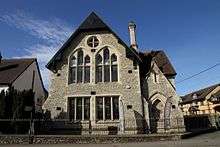Edward George Bruton
| Edward George Bruton | |
|---|---|
| Died | 1899[1] |
| Nationality | British |
| Occupation | Architect |
Edward George Bruton (17 February 1826 – 3 August 1899) was a British Gothic Revival architect who practised in Oxford. He was made an Associate of the Royal Institute of British Architects (RIBA) in 1855 and a Fellow of the RIBA in 1861.[1]
Born in Holywell, Oxford in 1826, the son of Richard Bruton, the Common Room Man at New College, and his wife Ruth, he was apprenticed to the architect John Plowman by the time of the 1841 census.
He is buried in St Sepulchre's Cemetery, Oxford.
Work
- Saint Sepulchre's Cemetery, Oxford: lodge (designed as part of the original plan in 1848, but not built until 1865)[2]
- Saint Paul, Walton Street, Oxford: added apse, 1853[3]
- Town Hall, Banbury, Oxfordshire, 1854[4]
- Saint Nicholas, Islip, Oxfordshire: restoration, 1861[5]
- 62 Banbury Road, Oxford: house, 1864–65[6]
- Christ Church Old Buildings, The Hamel, Oxford: tenement block, 1866[7]
- Saint Mary, Black Bourton, Oxfordshire: restoration, 1866[8]
- 64 Banbury Road, Oxford: house, 1868–69[9]
- Chapel of Cowley Middle Class School, Oxford Military College, Cowley, Oxfordshire, 1870
- Saint John the Evangelist, New Hinksey, Oxfordshire: church, 1870 (demolished 1900)[10]
- Saint Bartholomew, Ducklington, Oxfordshire: restoration, 1871[11]
- Rewley House, Wellington Square, Oxford: house, 1872[6]
- Saints Peter and Paul, Broadwell, Oxfordshire: restoration, 1873[12]
- Saint Nicholas, Emmington, Oxfordshire: enlarged rectory, 1873[13]
- Saint Mary, Hardwick, West Oxfordshire: rebuilt church, 1874[14]
- Saint John the Baptist, Stadhampton, Oxfordshire: rebuilt church and added south aisle, 1875[15]
- Saint Michael's Infants' School, New Inn Hall Street, Oxford, 1876[2]
- Saint Mary, Chipping Norton, Oxfordshire: vicarage, 1880[16]
- The Grange, Little Tew, Oxfordshire: new wing, 1880[17]

St Edburg's Hall, London Road, Bicester, built in 1882
- St Edburg's Hall, London Road, Bicester, Oxfordshire: 1882[18]
- Saint Bartholomew, Holton, Oxfordshire: vicarage, 1882[19]
- Saints Peter and Paul, Aston Rowant, Oxfordshire: restoration, 1884[20]
- Saint Andrew, Oddington, Oxfordshire: restoration, 1886[21]
- All Saints, Spelsbury, Oxfordshire: remodelled rectory, 1886[22]
- Covered Market, High Street, Oxford: roofs, 1886–97[23]
- Saint Mary, Souldern, Oxfordshire: rectory, 1890[24]
References
- 1 2 Brodie 2001, p. 284.
- 1 2 Sherwood & Pevsner 1974, p. 325.
- ↑ Sherwood & Pevsner 1974, p. 295.
- ↑ Sherwood & Pevsner 1974, p. 437.
- ↑ Sherwood & Pevsner 1974, p. 664.
- 1 2 Tyack 1998, p. 236.
- ↑ Sherwood & Pevsner 1974, pp. 238–239.
- ↑ Sherwood & Pevsner 1974, p. 458.
- ↑ Sherwood & Pevsner 1974, p. 319.
- ↑ Sherwood & Pevsner 1974, p. 335.
- ↑ Sherwood & Pevsner 1974, p. 589.
- ↑ Sherwood & Pevsner 1974, p. 489.
- ↑ Sherwood & Pevsner 1974, p. 492.
- ↑ Sherwood & Pevsner 1974, p. 633.
- ↑ Sherwood & Pevsner 1974, p. 776.
- ↑ Sherwood & Pevsner 1974, p. 539.
- ↑ Sherwood & Pevsner 1974, p. 691.
- ↑ Sherwood & Pevsner 1974, p. 456.
- ↑ Sherwood & Pevsner 1974, p. 650.
- ↑ Sherwood & Pevsner 1974, p. 427.
- ↑ Sherwood & Pevsner 1974, p. 730.
- ↑ Sherwood & Pevsner 1974, p. 775.
- ↑ Tyack 1998, p. 243.
- ↑ Sherwood & Pevsner 1974, p. 769.
Sources
- Brodie, Antonia; Felstead, Alison; Franklin, Jonathan; Pinfield, Leslie; Oldfield, Jane, eds. (2001). Directory of British Architects 1834–1914, A–K. London & New York: Continuum. p. 284. ISBN 0-8264-5513-1.
- Sherwood, Jennifer; Pevsner, Nikolaus (1974). Oxfordshire. The Buildings of England. Harmondsworth: Penguin Books. ISBN 0-14-071045-0.
- Tyack, Geoffrey (1998). Oxford An Architectural Guide. Oxford & New York: Oxford University Press. ISBN 0-19-817423-3.
This article is issued from Wikipedia - version of the 10/14/2016. The text is available under the Creative Commons Attribution/Share Alike but additional terms may apply for the media files.